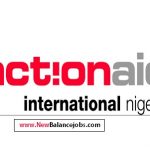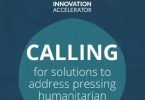
ActionAid (AA) Nigeria
Consultant – SARVE II End of Project Evaluation at ActionAid (AA) Nigeria. Please make sure you read the job requirements before applying for this position.
ActionAid (AA) Nigeria is an affiliate of ActionAid International, which is a global alliance of organisations working towards achieving a world without poverty and injustice in which every person enjoys the right to a life with dignity. As a large and visible development organisation, we work in more than 40 countries in Africa, Asia, Europe and America. Our expertise lies in community-led approaches to development and working through partnerships with the poor and other grass root organisations.
We are recruiting to fill the position of:
Job Title: Consultant – SARVE II End of Project Evaluation
Location: Kogi / Nasarawa
Background
- System and Structure Strengthening Approach against Radicalization to Violent Extremism (SARVE II) project is a three-year project funded by Global Community Engagement and Resilience Fund (GCERF) to establish and consolidate existing structures and practices within the context of prevention and response framework in project communities, among youth and women groups to tackle violent extremism and foster peaceful co-existence.
- The project is being implemented with Participation Initiative for Behavioural Change in Development (PIBCID) in Kogi State and Global Peace Development (GPD) and Beacon Youth Initiative (BYI) in Nasarawa State is supporting youths, women to engage actively with social and economic activities while also working with state and local government, ministries, departments and agencies (MDAs), traditional rulers, religious leaders, security agencies to create linkages and opportunities for young men and women.
- The three (April 2019 – December 2021) year project currently being implemented in Kogi and Nasarawa States with a budget of $2.5 million entails effective engagement with the community and formal institutions and processes to influence practices that address youth and women issues and supporting them to becoming active change advocates/agents.
Rationale:
- The SARVE II project which started in April 2019 will be winding down in December 2021. It is therefore pertinent for us to measure the impact of the project in line with the set objectives and results framework indicators and to identify the successes and challenges from the project implementation.
- The evaluation will also give room to assess the sustainability of the benefits generated and to draw recommendations and conclusions that will inform future design and programming.
Key Review Questions formulated under each objective should allow for an Assessment of:
- Relevance: did the project do the right thing in the right way? To what extent did the Project address the needs of all the youth and women regarding having access to preventing violent extremism and ensuring peaceful co-existence?
- Effectiveness: to what extent were the project objectives achieved?
- Efficiency: to what extent were the project resources utilized most cost-effectively and within the project timeframe?
- Impact: did the project achieve any direct and indirect, positive and negative, intended and unintended effects?
- Partnerships: to what extent were partnerships, alliances, and collaborations at all levels successful/key to the project’s success?
- Value for Money: to what extent did the project apply the principles of economy during implementation?
- Sustainability: to what extent is the sustainability of the project with regards to its financial, technical, and organizational aspects, and to what extent has the project ensured ownership and lasting change beyond the project lifetime?
Within the above objectives of the evaluation, this evaluation will assess the SARVE II project’s contribution towards preventing violent extremism and contribution towards peaceful co-existence through the three main project outcomes:
- Decreasing the vulnerability of at-risk young men and women
- Strengthening the Community Systems and structures to address Violent Extremism
- Improving and creating an enabling environment for Preventing Violent Extremism.
Methodology
- The evaluation will involve a mixed-methods approach including for example: desk review of secondary data (e.g., relevant project documentation), as well as additional primary data to be collected through Key Informant Interviews, Focus Group Discussions and/or Surveys with field visits by the consultant across 2 SARVE II States of Kogi and Nasarawa.
- The review would entail a deep consultative process involving direct and indirect beneficiaries as well as other stakeholders. At the local and state, level, the evaluation will be done by engaging with individuals and institutions including government agencies involved directly or indirectly with the project like Ministry of Women Affairs, Permanent Secretary of State Government, Local Government Areas, state SARVE II partners, and members of the intervention communities, etc.
Key Documents for Reference:
- The following key documents (in English) will be made available to the reviewer: SARVE II project proposal, Theory of Change (TOC), result-frame works, annual reports, mid-term project report, policy briefs, budget analysis reports, all project reports (including narrative and financial reports). Other documents as necessary include research reports, video products, articles, etc
Outline of the Review Report:
The Final Review report should not be more than 20 pages (excluding annexes/impact stories/case studies).
- Cover page (title of the evaluation report, date)
- Table of Contents
- Executive summary of no more than 4 pages outlining the key purpose of the evaluation, main points of analysis, key findings, conclusions, and recommendations
- An introduction outlining the background to the project and the evaluation
- Purpose and objectives of the evaluation
- An analytical framework of the evaluation on preventing violent extremism and ensuring peaceful co-existence in the intervention states.
- Methodology/approach, indicators used, ethical issues, and limitations of the evaluation
- Summary results against project ToC and Log-frame indicators
- Major findings
- Annexes: details of data collection tools, schedule of field visits and meetings; list of people interviewed; bibliography of key documents consulted; TOR for the Review. Impact Stories and Case studies should also be annexed).
Contract Period:
- The contract is for Sixty Days (60) days starting from the 1st of October 2021.
- Timeline: The duration of this end-of-project evaluation is 60 days. These are broken down into
- Suggested Timeframe: 60 days. Starting from October 1st 2021 to 30th November 2021.
Activity – No of Days:
- Inception meeting and a review of key background documents and existing data collection tools – 1
- Detailed inception report including detailed draft methodology and sampling approach for quantitative/qualitative data collection – 5
- Review of the developed quantitative and qualitative tools finalized in agreement with the programme teams – 5
- Pre-testing of data collection tools – 5
- Final approval from donor for draft methodology and sampling approach for quantitative and qualitative data collection tools – 1
- Recruitment and training of data collectors/enumerators for the two states – 10
- FGDs and key informant interviews (KIIs) / quantitative data collection and data entry for the two states – 20
- Data analysis and report writing – 10
- Submission of Draft Report – 2
- Submission of final Report by the research consultant(s) – 1
- Dissemination/Validation at End of Project Evaluation Closeout Meeting – 5
Roles and Responsibilities
The section below outlines key roles and responsibilities to be assigned to the two main parties at the End of the Project Evaluation process, and the consultants:
AA Country Team:
- Provide technical oversight to manage and support the overall End of Project Evaluation process e.g. facilitating and providing the required documents, facilitating fieldwork or virtual FGDs or KIIs for data collection, safety, and location of consultant(s), provision of logistical support, etc.
- Monitor and ensure that the End of Project Evaluation process is followed as per the agreed overall approach, methodology, and timelines.
- Provide technical input and quality assurance at all stages of the End of Project Evaluation process.
- Review the quality of the draft reports and provide timely feedback to the consultant.
- Provide Country Sign off on the End of Project Evaluation by the Resilience Coordinator at ActionAid Nigeria who will confirm reports satisfactory before balance payments are made
Consultants:
- Work closely with the Project Coordinator, IASL, state programme officers and partner organization on all the End of Project Evaluation processes.
- Contribute to the design of the End of Project Evaluation Inception Meeting to agree on the overall approach, methodology, framework, questions, methods, and tools for data collection and analysis.
- Conduct desk review and data collection.
- Produce consolidated End of Project Evaluation Report.
Required Profile for Consultant
The consultant (She/he) to be recruited should have the following experiences:
- A good understanding and practical experience of development work including advanced skills in Social Research, Project Impact Evaluation, Humanitarian studies
- Degree in the field of Social and Development Work, Social Research, Evaluation or another relevant Social Science subject (Masters/Ph.D. or Professor preferred)
- Have at least a minimum of 7 years’ experience in carrying out such an assignment and capacity for impact evaluation (a report of such work done in the last 2 years is a required evidence)
- Experience in developing tools for Project Impact Evaluations
- Excellent facilitation and writing skills (keeping it simplified)
- Understanding of the role of Monitoring & Evaluation in the programme cycle and experience of conducting learning reviews and evaluation processes, in the international development sector.
- Ability to apply a range of primary and secondary research methods including participatory methods.
- Experience in using qualitative and quantitative data analysis packages (e.g. SPSS and Nvivo).
- Computer literate and able to apply Microsoft Office and other analytical tools efficiently
- An excellent team worker.
Application Closing Date
17th September, 2021.
Method of Application
Interested and qualified candidates are to apply by sending a technical proposal (max 8 sides of A4) for the End of Project Evaluation including data collection methodology and work plan, sampling strategy, and data collection tools; CV detailing competency, links to sample of past works, and any other relevant information, demonstrating skill and experience in this area via: [email protected] using “SARVE II End of Project Evaluation” as the subject of the email.
Click here for more information
Note
- The selected consultant will sign a contract with AAN and is responsible for acquiring other relevant tools needed for the task.
- Candidates should include invoice detailing daily rate.
- Applications should be submitted in Microsoft Word file
- Only awarded contractor will be contacted.






